If you are organising an event to celebrate the International Year of Biodiversity, we encourage you to share your activities with us and everyone in your country. If you wish to see the information below in your official language, please send us a translation (.doc or .pdf) at [email protected].
If you have videos and photos of your celebrations of the International Year of Biodiversity, please send them to us!
India

National Celebrations
India's Final Report for the International Year of Biodiversity 2010
Brief summary of IYB 2010 celebration in India
The Foundation for Ecological Security (FES) launches the Avian Information System (AVIS) The AVIS is a portal that features detailed information on all Indian Birds, covering nearly 1329 species from Indian region. The portal is part of an initiative to build an interactive web-based database and information system on the biodiversity of the Indian subcontinent, called the Indian Biodiversity Information System (IBIS). Website
The launch of the International Year of Biodiversity in India was marked by a press/media meet by Mr. Jairam Ramesh, Minister of Environment and Forests on 4th January, 2010, in which the Minister released a biodiversity brochure entitled 'Achieving 2010 Biodiversity Target: India's Contributions', and a table calendar for the year 2010 was released by the National Museum of Natural History (NMNH) depicting award-winning entries by school children in a painting competition organised by NMNH during the Wildlife Week in October 2009 on the theme 'Our Rich Biodiversity'.
Press Release India taking leadership role in biodiversity conservation, to host ‘Rio + 20’ Summit in 2012
A special session on Biodiversity and Sustainable Development was organised on 7 January 2010, during the 97th Indian Science Congress inaugurated by the Prime Minister Thiruvanathapuram on 3 January 2010. In this special session, there were presentations and panel discussion on CBD, Indian Biological Diversity Act, ABS regime, etc. A Special Cover of Indian Posts on the International Year of Biodiversity was released on this occasion. The Indian Science Congress is an annual gala event wherein more than 10,000 people from all branches of science participate. This year there was a special session on Biodiversity.
Delhi will be the host of the Commonwealth Games 2010 (CWG) in October 2010. The Ministry of Environment & Forests is working closely with the CWG Organising Committee and the involvement of corporate sector, with the support of UNEP to make the CWG eco-friendly and green, and create awareness about the importance of conserving biodiversity. Some of the activities being planned for this purpose include: plantations proposed all along the route of Queen's Baton Relay (QBR) after it enter India on 25 June 2010, and passes through each of India's 28 States and 07 Union Territories covering more than 20,000 km; setting up a Garden of Champions, wherein saplings gifted to each of 620 medal winners at the Delhi CWG 2010 will be planted; use of intra-venue transportation by battery operated vehicles and bicycles, etc.
Conservation education among the poverty stricken illiterate labour class communities at Haldwani in Uttarakhand state, India
Kerala Forests and Wildlife Department, Government of Kerala The department manages the biodiversity rich forests of the State. Being in the Western Ghats hotspot, we are concerned about threats to biodiversity and we have introduced several measures to address these threats. During the International Year of Biodiversity 2010 we have planned several programmes aimed at biodiversity conservation, one of which is setting up a Biodiversity Conservation (research and Monitoring) Centre.
Press Release Children design contest for a safe and ecological Diwali celebration
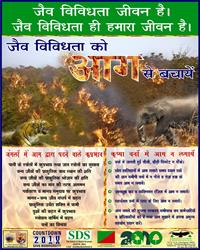 |
|
Forest Fire Control
Biodiversity is life. Biodiversity is our life. The focus of the poster is on forest fire control message for the communities who live along the fringes of the Corbett tiger reserve and Shivalik elephant corridor in Uttarakhand. |
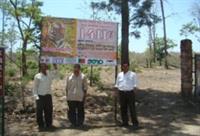 |
|
Save-Tiger Signage Boards
To raise the public awareness about the continuously declining population status of the Roral Bengal Tiger (Panthera tigris tigris) in India, Conservation Himalayas installed SAVE-TIGER Signage Boards at four tourist zones of the tiger range habitats in Uttarakhand. |
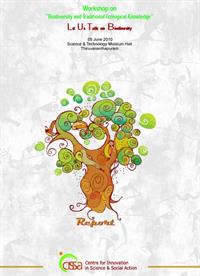 |
|
Workshop on “Biodiversity and Traditional Ecological Knowledge”
Let Us Talk on Biodiversity, Science & Technology Museum Hall Thiruvananthapuram (Report).
CISSA organised a workshop on the theme “Biodiversity and Traditional Ecological Knowledge” on 5th June 2010. This programme titled “Let Us Talk on Biodiversity” introduced traditional knowledge holders on biodiversity such as tribes, farmers, fishermen, traditional health practitioners etc to the student community for an interaction |
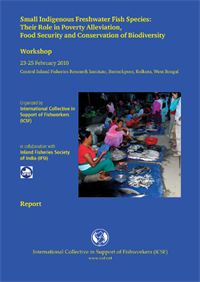 |
|
Workshop – Report
Small Indigenous Freshwater Fish Species: Their Role in Poverty Alleviation, Food Security and Conservation of Biodiversity |
National Food & Agro Biodiversity Festival ANNAM National Food and Agro-biodiversity Festival is an attempt to infuse a new food culture that ensures not only supply of healthy and ethically produced food but also facilitates conservation of rich biodiversity at grass roots. Report
Seacology is an international nonprofit, nongovernmental organization whose sole purpose is to preserve the environments and biodiversity of islands globally. Seacology has created an innovative model of island conservation and community development that has proven to successfully protect threatened island ecosystems, engage local stakeholders in modern conservation trends, promote international cooperation and dialogue, and ensure long-term benefits to rural island communities and the increasingly precious environments that surround them. To-date, Seacology has funded 195 projects on islands around the globe, preserving 1,812,720 acres of coral reef and marine ecosystems and 161,477 acres of terrestrial habitat. There remains much more work to be done, and Seacology intends to continue our legacy of success through additional innovative, grassroots programs aimed at preserving the world's most endangered ecosystems throughout 2010.
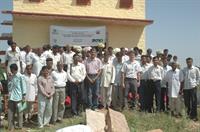 |
|
Farmer's Field Day
Bioversity International India held a Farmer's Field Day to celebrate the biodiversity of pearl millet where they planted a demonstration block and displayed 21 varieties of pearl millet. Over 90 farmers were present and at least a dozen agricultural scientists. |
Partners

Applied Environmental Research Foundation
www.aerfindia.org
Applied Environmental Research Foundation (AERF) has been working with a mission to achieve Conservation on ground for last 15 years in the Northern Western Ghats of India- a global biodiversity hotspot. AERF’s key strategy is to involve people in the process of conservation right from awareness generation to implementation. AERF’s pioneering work on Sacred grove’s conservation showcases the importance of ecosystem approach. Moreover AERF has also successfully demonstrated mainstreaming of biodiversity in cross-cutting issues such as energy and livelihoods through various initiatives. It is AERF’s constant endeavor to establish sustainable linkages between biodiversity conservation and human needs through applied research.

Centre for Innovation in Science and Social Action
www.cissa.co.in
Centre for Innovation in Science & Social Action (CISSA) is a civil society organisation based at Thiruvananthapuram (India) with a strong commitment for sustainable development and social action. The major programmes initiated by CISSA in its five years of existence include: - ANNAM- the people’s movement for good food, food security and food sovereignty,
- URJA – the National Exhibition of Energy Efficient & Renewable Energy Products and Technologies,
- Indian Biodiversity Congress (IBC), the largest get together of people who care for conservation and sustainable use of biodiversity in India,
- Global Ayurveda Festival (GAF) planned as a regular activity since 2012 to revitalise the traditional heath care system of India- Ayurveda -and to bring it to the global arena of health management

Indian Astrobiology Research Centre
www.astrobiology.co.in
Indian Astrobiology Research Centre (IARC) is a non-profit, autonomous scientific body that conducts and encourages research in Astrobiology. It is a Virtual Institute based in Mumbai.
Although IARC generally deals with Extraterrestrial matters we do appreciate the cause of more pressing Terrestrial Matters! Under the effective Education & Outreach Programme of IARC, it will conduct the IYB2010 promotion campaign titled Extraterrestrial First.
India has committed itself to achieve the 2010 Biodiversity Target to significantly reduce rate of loss of biodiversity. We want students to review the biodiversity conservation efforts and underline the realized and potential impacts.

International Centre for Integrated Mountain Development
www.icimod.org
The International Center for Integrated Mountain Development, ICIMOD, is a regional intergovernmental learning and knowledge sharing centre serving the eight regional member countries of the Hindu Kush Himalayas – Afghanistan, Bangladesh, Bhutan, China, India, Myanmar, Nepal, and Pakistan – and based in Kathmandu, Nepal. The mission of the center is to enable and facilitate the equitable and sustainable well-being of the people of the Hindu Kush-Himalayas by supporting sustainable mountain development through active regional cooperation. ICIMOD, therefore, aims to assist mountain people to understand global environmental and socio-economic changes, adapt to them, and make the most of new opportunities, while addressing upstream-downstream issues.

KIIT Centre for the Environment and Global Sustainability
www.kiitcegs.org
KIIT-CEGS is a boundary organization at the knowledge-policy-action continuum with an overarching goal of ‘knowledge for change’. Establish by the Kalinga Institute of Industrial Technology (KIIT) University, KIIT-CEGS has been persistently engaged in efforts to support and strengthen an enabling platform for various stakeholders to come together for collaboration and joint efforts on various issues of environment, climate change and disaster risk reduction. As part of the Environment and Natural Resources (ENR) programme we have been working with ecosystem-dependent communities for greater institutional interplay among biodiversity conservation, poverty alleviation and climate change adaptation in coastal Orissa.

Nature Foundation (India)
www.nfindia.org
Nature Foundation (India) is a non-government organization dedicated towards environmental and ecological concerns.
The biggest challenges that India faces on her development roadmap is the issue of environmental sustainability in the likes of pollution, deforestation, climate change, water shortage, natural disasters, soil depletion, drought waste piling and wildlife trade among others.
We work towards raising these concerns and sensitizing the society as a whole. We are a team of young volunteers with an aim to create a sustainable world seeking solutions to these environmental problems and implementing them. We are working towards a goal with the hope to create a better environment to live in free from pollution for present and future generations.
In our four years of existence, since 2004 we have worked on several projects starting from the grassroots to the levels of the legislature, thinkers and strategist. We are a group of open minded, committed people and promote community involvement and therefore constantly look forward to expand our family.

North East Centre for Environmental Education and Research
www.neceer.org.in/p/international-year-of-biodiversity.html
North East Centre for Environmental Education and Research (NECEER) is a non profit public interest research and educational organisation based in Imphal, Manipur. NECEER was established with an aim to educate and create awareness about the changing environment and conservation of biodiversity in North-eastern states of India through non formal education by organising training programme, workshops, campaigns, seminars, etc. Research and Development Division of the organisation is involved in the exploration of the floral and faunal diversity of the region and framing of conservation strategies with the help of local communities for the conservation of biodiversity. Taxonomical surveys, ecological and ethnobotanical studies are some of the initial works taken up until fully equipped laboratories are established. Conservation of sacred groves, wetlands, water bodies and fragmented ecosystems are given priority in the sustainable development programme of the organisation. NECEER publishes newsletter and magazine for the dissemination of environmental awareness and conservation of biodiversity of Northeast India.

Peerless Green Initiatives
www.peerlessgreen.net
Peerless Green Initiatives, (PGI) is a ‘green’ consultant group and network head of green professionals. We operate in U.S. and India with an emphasis on creating lasting domestic and international tie-ups with corporations, NGO’s and GO’s to promote the research, development, testing, piloting and implementation of sustainable enterprises. Our primary focus is on clean energy (wind, solar, biofuels), sustainable commercial practices (LEED, IGBC, FTO and Organic Labelling), development strategies, business planning and crisis management. More (pdf)

Sustainable-Kerala.Net
sustainable-kerala.net
The mission of Sustainable-Kerala.Net is to bring together scientists, governmental agencies, non-governmental organizations, industry representatives, producers, consumers and responsible public interested in playing a role in promoting biodiversity conservation and sustainable development in general and of Kerala in particular. It is also aimed to promote advanced research in various aspects of sustainable development and to develop a model laboratory accredited not only to do research and development of sustainable and environment friendly techniques but also to scientifically validate them.

The Corbett Foundation
www.corbettfoundation.org
The Corbett Foundation was set up in 1994 by Shri. Dilip D. Khatau, an ardent wildlife lover, a former Member of National Board for Wildlife in India and Chairman of Conservation Corporation of India. The Corbett Foundation (TCF) mainly works in and around the Protected Areas like Corbett, Bandhavgarh and Kanha tiger reserves and the Greater Rann of Kutch with a strong focus on wildlife conservation & research, environmental awareness, community outreach, cattle care & development, watershed management and sustainable development with active involvement of local stakeholders. Over the years, TCF has taken up some innovative and meaningful conservation initiatives, e.g. Interim Relief Scheme Programme, Solar-fencing Project, Mahseer Conservation Programme in Corbett; Cattle Development Programme, Grassland Restoration, Watershed Management in Kutch, Solar-lanterns project, Snake rescue & awareness in Bandhavgarh; and Vocational training of tribals, Wildlife Awareness Programme in Kanha, among many other programmes and activities. The Rural Medical Outreach Programme that provides primary healthcare to over 400 villages is one of the most popular programmes of TCF.
World Earth Day 2012 Celebrations
World Migratory Bird Day 2012 Celebrations
World Endangered Species Day 2012 Celebrations

Uttaranchal Bamboo and Fiber Development Board
ubfdb.org
The need to promote bamboo & fiber based livelihood options in a mission mode lead to the establishment of Uttaranchal bamboo and fiber development Board (UBFDB) in the year 2003, registered under the society's registration act 21 of 1860. Uttarakhand Bamboo and Fiber Development Board was established under the aegis of the Govt. of Uttarakhand as part of the entrepreneurship development policy of the state. The mandate given to organization was clear, to sustainably utilize, manage and develop the existing resource base of bamboo & natural fiber in the state. Within a short span of time the states nodal agency for is involved in the entire production to consumption system of bamboo and natural fiberfor initiating and replicating of bamboo and fiber development activities.


Wildlife Institute of India
www.wii.gov.in
The Wildlife Institute of India is a premier training and research institution in the field of natural resource conservation. Its vision is to “Strive for recognition as a ‘centre of excellence’ for Wildlife Conservation in National and International forum” and its mission is to “To nurture the development of Wildlife Science and promote its application in conservation, in consonance with our cultural and socio-economic milieu”.

World Institute for Nature (WIN)
worldnatureinstitute.org
World Institute for Nature (WIN) is a public trust established under the Bombay Public Trust Act, 1950 (Reg. No. E/5081). WIN started its operations on 1st January 2008.WIN aim to promote exploration, understanding, conservation and sustainable use of the world’s biological resources through its holistic understanding, assessment, and forecasting. This to happen, WIN would undertake activities from anthropology to zoology, economy to sociology, and politics to culture.

Young Naturalist Network
[email protected]
YOUNG NATURALIST NETWORK, a non-government organization was established by a group of young nature lover activists, researchers, PhD students, scientists and educationists. We work with various issues related nature & biodiversity conservation like – field studies, strategic conservation programs, researches, documentation and documentary film making , etc. In the last two years, we have focused on the most important Biodiversity Hotspot Area of India Western Ghats and Eastern Himalaya in India and moving onwards with big research and conservation works…by YNN India Biodiversity Action Plan. Developing DNA Barcoding as a Global Standard for Identifying Species in throughout India. It helps to develop Molecular Ecological Strategy to conservation of Biodiversity in hot spot areas (Western Ghats, Eastern Himalaya) in India.
|